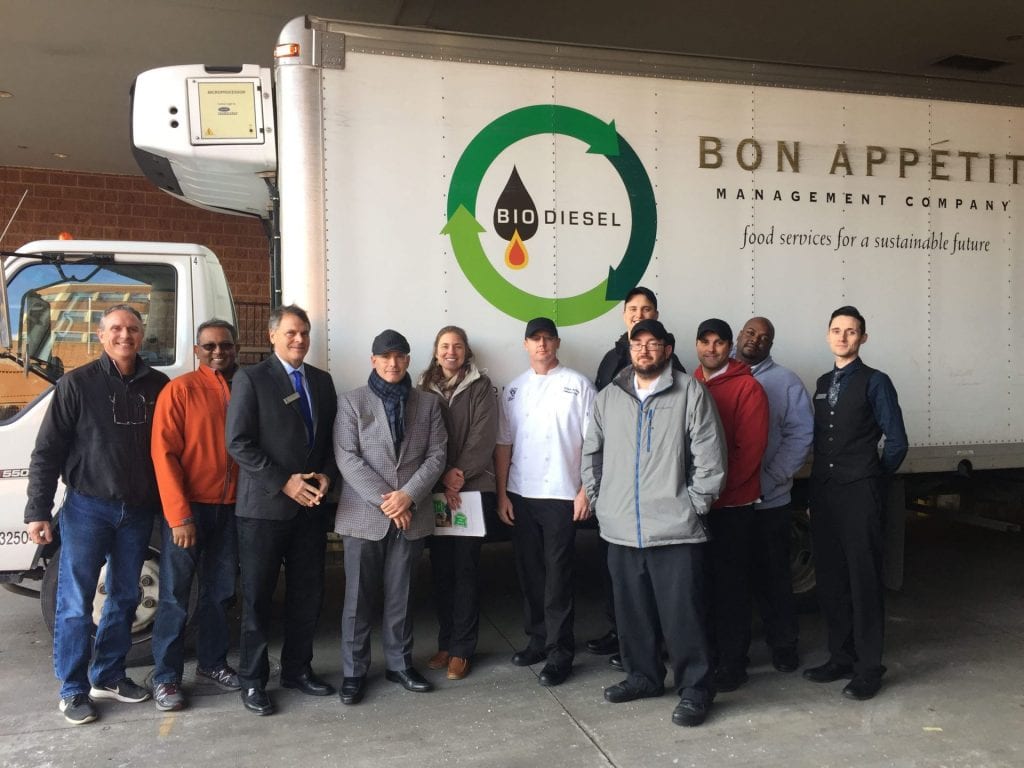This November, Washington University in St. Louis is starting a new partnership with the Rockwood School District Renewable Fuel Project to re-launch a closed loop, cradle-to-cradle cooking oil recycling program.
This program will allow WashU Dining Services to fuel its three diesel catering trucks with a 50/50 blend of biodiesel year-round. It anticipates reducing the GHG emissions of these trucks by about 45%, as well as significantly decreasing particulate emissions!
An exciting partnership with Rockwood School District
About two years ago, WashU approached Rockwood Summit High School’s Renewable Fuel Project with a partnership proposal. Chemistry teacher Darrin Peters had been running a successful cooking oil recycling program since 2014 as part of the school’s academic and extracurricular offerings. They received some notable grants to establish the program and were producing enough biodiesel to run a school buses, two work trucks, and some lawn equipment. A new grant from the St. Louis-Jefferson Solid Waste Management District covered equipment for additional collection and processing capacity to service WashU and sell back the surplus fuel to power catering trucks again.
With the equipment purchased and installed, infrastructure improvements, and all the logistics worked out, the two organizations are ready to launch the new partnership, closing the loop again from fryer to fuel. High school students will process the waste oil, test it for purity, create soap from the glycerin, and help manage the marketing and business aspects of the program. WashU will benefit from the ability to recycle waste oil into fuel. This is a truly win-win project!
Why Biodiesel?
Biodiesel is made from vegetable oils or animal fats through a process called transesterification. This process splits the oil into alkyl esters and glycerine. Esters make fuel and glycerine can be used to make soap and beauty products. Biodiesel can be made from either waste oil or virgin oil with equally good results.
Biodiesel has several virtues:
- It is made from renewable resources and, ideally, finds a new purpose for a waste product.
- It is biodegradable.
- Compared to diesel, biodiesel has the potential to reduce GHG emissions by over 80% on a lifecycle basis.
- It reduces several tailpipe emissions, including particulate matter, hydro carbons, and carbon monoxide (though there may be a slight increase in nitrous oxide).
- It provides additional lubrication for the engine, enhancing performance.
- Diesel vehicles do not require modification to run on biodiesel or biodiesel blends.
- Miles per gallon remains virtually the same, though 100% biodiesel does have slightly lower energy content than petroleum diesel.
- It reduces dependence on foreign oil and the embodied transportation and processing impacts of petroleum-based fuels.
Biodiesel project background
In 2011, WashU launched the first iteration of this program through an innovative partnership with 2008 WashU alum, Kris Kelley. Kelley, founder of Kelley Green Biofuel, collected spent cooking oil from five WashU kitchens. The oil was driven to a recycling facility in Louisville, Kentucky where it was recycled into biodiesel, then sold back to WashU to fuel three Dining Services catering trucks. This system worked successfully for five years, capturing about 4,800 gallons of waste oil each year and buying back just over 1,000 gallons of blended biodiesel. When fuel prices dropped dramatically in 2016, Kelley opted to end the program at WashU and focus efforts in Louisville. At that time, WashU began recycling cooking oil through GreaseMasters, but had to end the closed-loop aspects of the program, because of the lack of local suppliers of recycled biodiesel. Today, thanks to this new partnership with the Rockwood School District Renewable Fuel Project, WashU can finally re-close the loop of its cooking oil recycling program.
Thank you to the many partners who have made this program possible: RSHS Biodiesel Project, Rockwood School District, St. Louis-Jefferson Solid Waste Management District, Missouri Department of Natural Resources, Washington University Dining Services, Bon Appetit, Office of Sustainability, Office of the Vice Chancellor and General Counsel, Environmental Health and Safety, Ranken Technical College, and the Facilities Department. To learn more, volunteer, or get involved, please contact Cassie Hage, Office of Sustainability: cassandra.hage@wustl.edu.
References:
